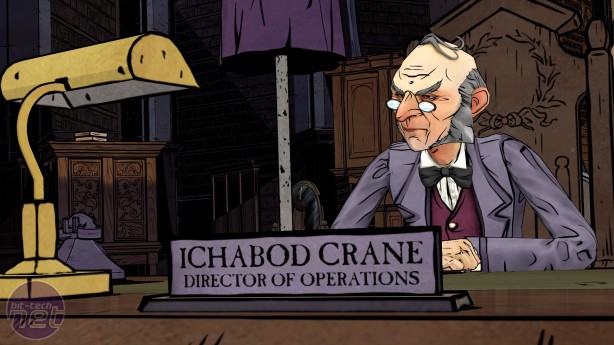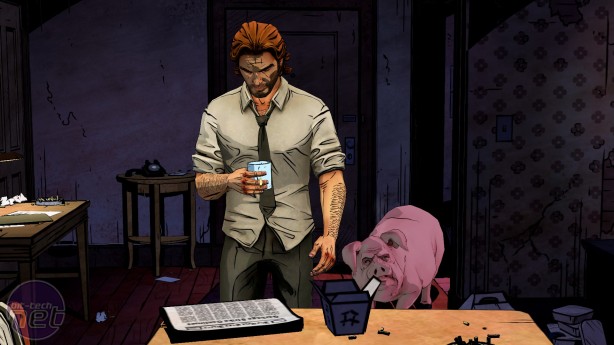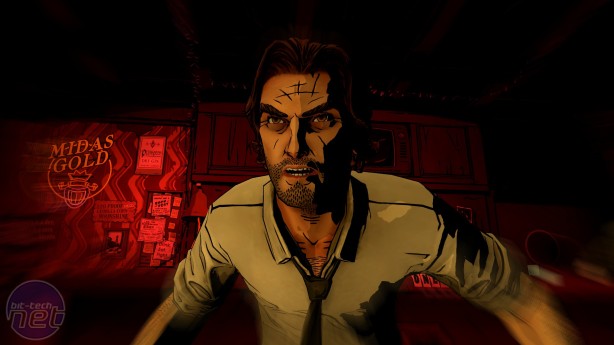
This early in the series, it's difficult to judge whether The Wolf Among Us will resolve this issue. But it is definitely trying to address it. Not only do you make choices regarding what happens, you also choose when to go to certain areas, and the order in which you do things can have significant consequences. Granted, there's only one instance of this in the first episode, but no doubt there will be more further down the line.
Alongside that, the game is also considerably more fastidious in logging important moments that occur. If a statement made to a character influences them, a little text box will appear reading "He will remember that." If a choice is made, such as giving somebody money, it will say "You chose to give her the money." The Wolf Among Us wants you very much to know the choices you're making have alternatives, and do influence the game. If anything, it's a little too eager to show off its choices, as there's no option to switch these announcements off, which may frustrate those who simply want to be absorbed in the world.
Even the action sequences have been tweaked to give the player a greater sense of agency within the narrative. They're still entirely based on Quick-Time-Events, yet instead of having you fail the game if you mis-time pressing a button during a fight, the brawl will continue on in a different manner, and you'll get another, separate chance to input the right command. Not only does this help alleviate the frustration of dying in a glorified cut-scene, it also makes the game that little bit more personal toward you.
The Wolf Among Us shows great promise in the malleable nature of its narrative, but ultimately its quality in that regard is subject to where those choices lead. In terms of the story it tells, however, it's already clear that writer Pierre Shorette is capable of weaving an enjoyable tale. The plot doesn't have the same urgency as The Walking Dead for obvious, shambling reasons. That said, Bill Willingham's noir fairytale universe provides a far more interesting backdrop to tell a story in. Standout characters include Colin, Bigby's porcine flatmate, and The Woodsman, Bigby's axe-wielding adversary from the Red Riding Hood days, whose luck has taken a rather sharp turn for the worse since that one moment of inadvertent heroism.
There are a couple of issues, the first of which is technical. The art style is absolutely splendid, every screenshot taken looks like a panel from a comic, but it can't hide the fact that the Telltale Tool engine is on the verge of blowing a gasket. It's little wonder the game rarely hands you full control of Bigby, because these moments are hideous. He moves like an articulated lorry, ponderously slow with a tendency to get stuck on tight corners. And at one point the game began to stutter despite only having to render a modest-sized courtyard.
The other question is to do with character and plotting. While the game's characters are more intriguing than The Walking Dead, currently they're also less relatable, with no central relationship to draw you in. Moreover, without going into too much detail for fear of spoiling the plot, the first episode's "big twist" could well cause problems in this regard further down the line. It is perhaps a little overeager to shock without sufficiently involving the player beforehand. Still, it does work, and will undoubtedly leave you wondering how exactly the story will proceed next.
The Wolf Among Us is a bold and confident debut from Telltale in its latest attempt to merge HBO style drama with the freedom of choice that games make possible. It's intelligent and stylish, and makes a clear effort to show that its narrative branches don't lead straight back to the trunk. It's still early days yet, but it's already intriguing enough to be worth the entry fee. We'll check back in December to see how the series is progressing.
Alongside that, the game is also considerably more fastidious in logging important moments that occur. If a statement made to a character influences them, a little text box will appear reading "He will remember that." If a choice is made, such as giving somebody money, it will say "You chose to give her the money." The Wolf Among Us wants you very much to know the choices you're making have alternatives, and do influence the game. If anything, it's a little too eager to show off its choices, as there's no option to switch these announcements off, which may frustrate those who simply want to be absorbed in the world.
Even the action sequences have been tweaked to give the player a greater sense of agency within the narrative. They're still entirely based on Quick-Time-Events, yet instead of having you fail the game if you mis-time pressing a button during a fight, the brawl will continue on in a different manner, and you'll get another, separate chance to input the right command. Not only does this help alleviate the frustration of dying in a glorified cut-scene, it also makes the game that little bit more personal toward you.
The Wolf Among Us shows great promise in the malleable nature of its narrative, but ultimately its quality in that regard is subject to where those choices lead. In terms of the story it tells, however, it's already clear that writer Pierre Shorette is capable of weaving an enjoyable tale. The plot doesn't have the same urgency as The Walking Dead for obvious, shambling reasons. That said, Bill Willingham's noir fairytale universe provides a far more interesting backdrop to tell a story in. Standout characters include Colin, Bigby's porcine flatmate, and The Woodsman, Bigby's axe-wielding adversary from the Red Riding Hood days, whose luck has taken a rather sharp turn for the worse since that one moment of inadvertent heroism.
There are a couple of issues, the first of which is technical. The art style is absolutely splendid, every screenshot taken looks like a panel from a comic, but it can't hide the fact that the Telltale Tool engine is on the verge of blowing a gasket. It's little wonder the game rarely hands you full control of Bigby, because these moments are hideous. He moves like an articulated lorry, ponderously slow with a tendency to get stuck on tight corners. And at one point the game began to stutter despite only having to render a modest-sized courtyard.
The other question is to do with character and plotting. While the game's characters are more intriguing than The Walking Dead, currently they're also less relatable, with no central relationship to draw you in. Moreover, without going into too much detail for fear of spoiling the plot, the first episode's "big twist" could well cause problems in this regard further down the line. It is perhaps a little overeager to shock without sufficiently involving the player beforehand. Still, it does work, and will undoubtedly leave you wondering how exactly the story will proceed next.
The Wolf Among Us is a bold and confident debut from Telltale in its latest attempt to merge HBO style drama with the freedom of choice that games make possible. It's intelligent and stylish, and makes a clear effort to show that its narrative branches don't lead straight back to the trunk. It's still early days yet, but it's already intriguing enough to be worth the entry fee. We'll check back in December to see how the series is progressing.
-
Overall80 / 100


MSI MPG Velox 100R Chassis Review
October 14 2021 | 15:04












Want to comment? Please log in.